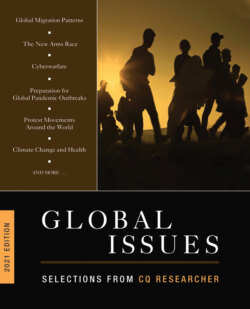Читать книгу Global Issues 2021 Edition - Группа авторов - Страница 41
На сайте Литреса книга снята с продажи.
Outlook Continued Standoff?
ОглавлениеMiddle East analysts agree negotiations are unlikely between the Trump administration and Iran before the 2020 U.S. elections. As long as the administration maintains its sanctions and Tehran continues to regard them as unacceptable, Iran probably will not come to the table.
Another obstacle to negotiations: President Rouhani’s reform movement is expected to lose seats in Iran’s parliamentary elections in February to hard-liners who reject any engagement with the United States, according to Iranian journalist and political analyst Saeid Jafari. And if Trump wins re-election, U.S. and Iranian experts agree, the administration’s standoff with Iran will probably continue, with neither side in any hurry to enter into talks.69
The Peterson Institute’s Mazarei says the sanctions eventually will force the Rouhani government to print more money, boosting inflation. But Tehran appears confident that the public, already accustomed to hardship, will weather the additional loss in real income, he says. “So we’re talking about survival with considerable amounts of pain,” he says.
Former ambassador Crocker agrees. “If President Trump’s gamble is that the unhappiness of the Iranian population will lead to regime-destroying unrest, he’s deluded,” Crocker says. “The more damage our pressure does to the economy, the tighter the solidarity around the leadership becomes.”
Public opinion polls in Iran support Crocker’s analysis. A survey in May 2015—a few months before the JCPOA was signed—by the University of Maryland’s Center for International & Security Studies showed that 26.3 percent of Iranians cited foreign sanctions and pressures as the major cause of Iran’s economic woes. By October 2019, that number had grown to 37.5 percent.70
Even if a Democratic president returns the United States to the Iran nuclear deal and lifts the sanctions, Tehran anticipates that any new round of negotiations would include pressure for tighter restrictions on its nuclear program, missile development and support for regional proxies, says the RAND Corp.’s Tabatabai. Thus, she expects Iran to continue breaching the nuclear deal in order to accumulate leverage in future talks.
No matter who wins the U.S. election, analysts agree Iran likely will continue swaying elections in Lebanon and Iraq and providing military muscle for its proxies where Shiites are fighting for power or confronting Israel. At the same time, Israeli military strikes against those proxies in Lebanon, Syria and Iraq will continue, the analysts say. Likewise, military experts expect Iran to continue developing its missile capabilities, a far cheaper and more realistic national security option than trying to build up a modern air force while under sanctions.
Finally, veteran diplomats say, unless U.S. policy changes dramatically, the coming years likely will be marked by a deep distrust among America’s allies of U.S. trustworthiness. Trump’s abandonment of Kurdish allies in Syria has forced allies such as Israel and the Gulf Arab states to question, for the first time, long-standing U.S. security commitments. Others, like Turkey and Egypt, have turned to Russia for weapons.
It will take years to rebuild U.S. credibility, these diplomats say. “We’ve lost our political leverage in the region,” says former ambassador Freeman. “We’re in a world now where no one wants to put all their eggs in our basket.”
Former IMF senior executive Askari predicts that tensions between the United States and Iran will continue to build, pushing both countries closer to a military confrontation they say they want to avoid.
“Time is not on the side of better Iran-U.S. relations,” he said. “Distrust of the U.S. has ballooned among leaders in Tehran after the U.S. tore up the nuclear deal and exited the agreement. War, or an accidental war, is much more likely today than reconciliation and fruitful relations.”71
